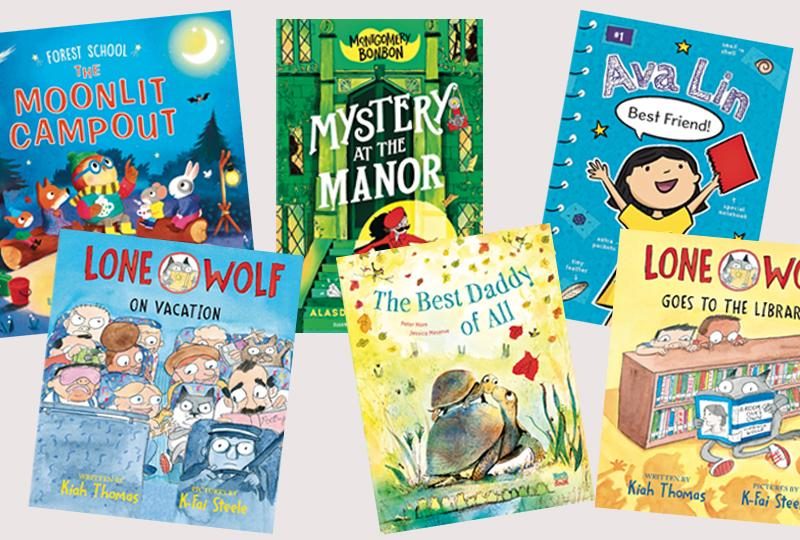
Teachable Talents
By Sandra Gordon
When my daughter was in Grade 4, a proud tear sprang to my eye when her teacher, known to be a stern taskmaster, declared: “Rebecca has something that can’t be taught – motivation.” Rebecca, my shy, eldest child, was a rule follower who always tried her best. Still, was she inherently self-motivated or just afraid of making Mrs. Mekka mad if she didn’t complete her assignments?
I couldn’t be sure. But her teacher’s comment got me thinking about how character traits develop. Are they born or made? It depends. Aside from self-motivation, which can be challenging to impart to others, many seemingly innate qualities can be learned, including creativity, empathy and self-confidence. Here’s how to instill these three valuable virtues in your kids – and yourself. As our experts will attest, all it takes is a little homework.
Coaxing Creativity
Using your imagination to create something new is a rewarding life skill anyone can develop. “Creativity is born from a child’s fantasy life, when he’s just playing or doing nothing and drawing on his own inner resources,” says artist and creativity expert Lynn Newman (lynnnewman.com). Kids are used to be being told what to do. But freeing up some screen-free down time is key to
the creative process.
“It’s important to let kids roam and explore, even if they’re just daydreaming
on their bed. That fantasy world is where inventiveness is born,” Newman says.
Doing nothing doesn’t always come easy. Many kids will soon complain that they’re bored. But instead of suggesting what to do, such as baking cookies or planting flowers, “let kids be uncomfortable in that void and figure out how to fill it themselves,” Newman says. To get your child started, you might ask: “What’s the easiest thing you could do right now?” Or, “So what if you’re bored? Now what?”
Whatever your child comes up with, resist the urge to judge it. “Kids want to create for the thrill of inventing, not for the product,” Newman says. If your child decides to paint, for example, don’t say “that’s a good thing to do” or declare that the resulting picture is pretty. Judgment calls – good or bad –condition kids to seek validation, which squashes creativity. Instead, keep your comments neutral, such as “that’s interesting,” or say nothing and just be present.
The essence of creativity is being comfortable with the uncomfortable and seeing what ideas spring from it. It’s a personal process that can translate to adulthood. “When we give ourselves permission to sit still and ponder what’simportant and what has meaning for us, we can create more of what we want in our lives,” Newman says.
Encouraging Empathy
“Empathy—being able to stand in someone else’s shoes and understand how it feels to be there—can be taught to children,” says renowned psychiatrist Gail Saltz, MD, who is also creator of the Podcast,
“The Power of Different.” Seeing the world in multi dimensions is an important viewpoint.
“Empathy gives you the objectivity to step out of a situation, look at it, then step back in and make better decisions for yourself,” Dr. Saltz says. “It’s about becoming an understanding bystander.”
If your child complains that a friend is suddenly not being nice, for example, empathy can help her consider
what might be going on that’s causing the friend to act that way instead of automatically taking the behavior personally and ending the friendship. Empathy also allows kids to see that we’re not so different from each other, even if we might look that way.
“There are more families than ever that are of multi-race, religion or same sex,” Dr. Saltz says. When children learn to be empathetic, they can note similarities within those differences, such as we’re a family, they’re a family.
We love each other. They love each other. We go on vacation. They go on vacation, and so on. “Empathy teaches acceptance and builds mutual understanding and trust,” Dr. Saltz says. Fostering empathy starts with role modeling empathetic behavior yourself and talking about it. For example, if you ask a new mom in the neighborhood out for coffee, why not mention it to your kids that because she’s a newcomer, she might be lonely and looking for a friend? Also, discuss the social situations your kids mention or in the news by asking open-ended questions, such as: “What do you think about that?” Teaching empathy starts by engaging your kids in conversation about social and personal issues and drawing them out, Dr. Saltz says.
Inspiring Self-Confidence
Kids today are suffering from a confidence crisis, says Heather Hans, a licensed clinical social worker and author of “The Heart of Self-Love: How to Radiate with Confidence”. “They’re growing up with Facebook, Instagram and Snap Chat, where everything is about image,” says Hans, who has a 10-year-old son. “They’re worried about whatother people will think of them, exhausted from the increased academic demands and competition and scared to get make a move or a commitment.”
A fear-based attitude can hold anyone back from reaching their potential. But there are lots of ways to promote a culture of confidence within your family. It begins with you. “Our own self-work rubs off on our kids,” Hans says. For starters, get into the habit of graciously accepting compliments instead of humbly dismissing them, such as saying“Thank you” if someone says: “I like your shirt,” rather than “What? This old thing?” When your child overhears you accepting a compliment, you send a message that you’re worthy of the praise. “We teach people how to treat us by how we treat ourselves,” Hans says.
It’s also helpful to acknowledge when you’re angry, hungry or tired, as in “I’m exhausted so I’m going to take a break instead of trying to plow through this project.” “If we don’t take care of our basic human needs, it can take longer to get things done and feel like doomsday, which can wear on our self-esteem,” Hans says.
Finally, take healthy risks. “Do something that scares you that will help you grow and encourage your kids to do the same,” says Hans. If you’re terrified of public speaking, for example, volunteer to give a presentation at work and tell your kids about it. “There’s no better way for us to gain confidence than getting out of our comfort zone,” Hans says.
Sandra Gordon is an award-winning writer who delivers advice and the latest developments in health, nutrition, parenting and consumer issues.







